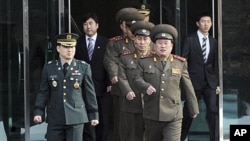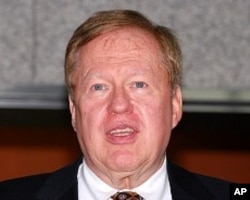Talks led by colonels of the opposing Korean militaries were held in the border village of Panmunjom, Tuesday -- the first such encounter since last November’s fatal shelling of a South Korean island by North Korea. South Korean officials say the two sides have agreed to hold further talks Wednesday. There are hopes this will mean an easing of tensions between the two Korea's.
Defense officials say the first day of preliminary talks, in a building known as "Peace House," in the demilitarized zone spanned more than nine hours, including several breaks.
A South Korean military spokesman says the two sides are trying to narrow differences on the agenda and procedural matters to reach agreement on holding talks between higher-level officials.
Bridging the Gap
Professor Kim Young-hyun of Dungguk University’s North Korean studies department says it seems both sides are having difficulty bridging the gap.
But Kim predicts agreement Wednesday on higher-level talks, saying Pyongyang and Seoul are under pressure from their respective allies, the United States and China, to engage in greater dialogue.
South Korean media reports say Pyongyang offered no apology, as demanded by Seoul, for last November’s shelling, nor did it take responsibility for the sinking of a South Korean warship in the Yellow Sea, 10 months ago. Instead, the North Korean officers are insisting on a broader discussion at higher-level talks to ease military tensions.
South Korean officials say apologies for last year’s lethal provocations are pre-conditions to arranging those more senior discussions.
Rights issues
As the colonels talked at Panmunjom, here in the South Korean capital, a U.S. special envoy tasked with the North Korean human rights issue was meeting with South Korean diplomats.
Ambassador Robert King terms his visit a fact-finding mission that will include hearing from North Korean defectors and others to learn about the reclusive communist state’s human rights record.
"It's extremely important for the United States, as we pursue our policies towards North Korea, to coordinate with the government of South Korea," King said. "We have a close working relationship. We're able to work together on issues. We share our analysis. We share our ideas, in terms of making progress. And, I'm grateful to say that we've had some
very good discussions while we've been here."
Food aid
The envoy declined to answer reporters’ queries on whether the talks dealt with the possible resumption of food aid to North Korea from the United States.
There have been reports that Pyongyang, through its United Nations mission in New York, has made that request.
Such U.S. assistance was halted in 2009 amid concerns about North Korea’s nuclear and missile tests.
North Korea is one of the world’s poorest countries and suffers from chronic food shortages, because of poor harvests and failures of managing its economy.
One of the South Korean diplomats whom King met on Tuesday is about to head to Beijing. The South Korean foreign ministry says Wi Sun Lac, its top envoy on the North Korean nuclear issue, will hold talks Thursday with his Chinese counterpart, Wu Dawei.
Pyongyang’s recently acknowledged uranium program is expected to be
one of the topics.
If North Korea is able to produce highly-enriched uranium it would give the country a second way to build nuclear weapons.






